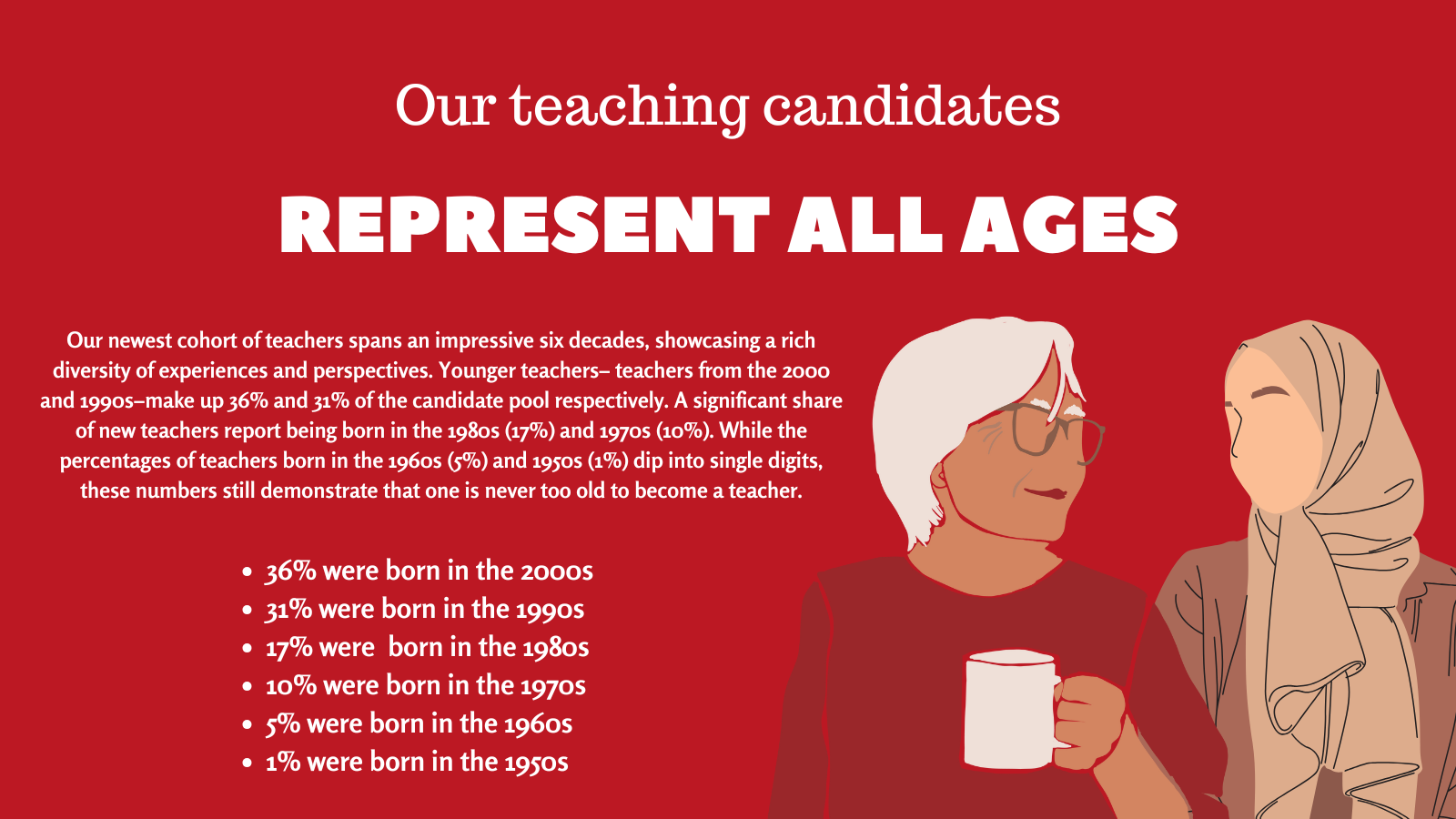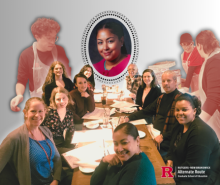Is It Too Late to Become a Teacher?

Starting over is more intimidating than it seems, just ask the Rutgers Alternate Route candidates.
Every person who goes through the program has a unique background and pre-teaching story. Something else they have in common? They didn’t let age drive a wedge between them and their teaching dreams.
There are many reasons people become teachers later in life, or even make a career switch shortly after graduating from college. Wrong timing, personal evolution, career epiphanies and more contribute toward an individual’s decision to switch gears. All of those reasons are valid and ultimately lead to significant personal growth.
In its more than two decades, Rutgers Alternate Route has seen individuals of all ages reach their dream of becoming a teacher. And, with more flexible programs accommodating career changers, it is easier than ever to become a teacher at any age.
Still not convinced?
Read on to learn how age and life experience can give new teachers leverage as they begin their journey.
There’s no ‘right’ timing
Preconceived notions can trigger anxieties about getting a teacher certification. This Reddit post from six years ago is a great example. Its author was 26 at the time and worried that their age would be an obstacle.
The post received 75 comments, with teachers validating the author’s feelings and sharing that the grass is not always greener on the other side.
One person shared that, at 40 years old, teaching was their third career, while another pointed out how perceptions toward teaching may be deceiving.
“I am 32 now and I am still one of the 3-4 youngest teachers at my school,” they said.
Sharing their story, one teacher became certified around the same age, with three children at home. The additional life experience was a bonus, they said.
“I was in the weird situation where all of the other new graduates were either in their early 20s or early 40s, so I didn't really fit in anywhere. Don't stress out too much, though, I found that all of the other life experiences and prior jobs and careers have given me a leg up on other grads.”
Another user in a similar dynamic said their kids helped shape how they manage their classroom.
“I feel so, so grateful it worked out like this. I think if I'd entered the classroom before I had kids, I'd have had no idea how to manage that class or relate to those kids (not saying this is true for everyone, but I was very awkward around/scared of kids before I had my own).”
What’s the best age to become a teacher in New Jersey?

Rutgers Alternate Route data says any age is the best age to become a teacher. The program’s 2024 cohort spanned an impressive six decades, showcasing a rich diversity of experiences and perspectives. Younger teachers– teachers from the 2000s and 1990s–make up 36% and 31% of the candidate pool, respectively.
The latest analysis of new teachers joining the profession reveals some fascinating insights into the generational makeup of our educator workforce. Alternate Route’s newest teacher cohort boasts a remarkable six-decade spread, showcasing a rich diversity of experiences and perspectives. Nearly two-thirds (66.5%) of the program’s new teachers were born between 2000 and 1990, placing them in Generation Z and the younger Millennial generation.
This influx of young educators signifies a wave of fresh perspectives, tech-savvy approaches, and an inherent understanding of the digital world that today's students navigate. Their presence promises innovative teaching methods and a natural ability to connect with younger generations.
Additionally, a significant share of new teachers report being born in the 1980s (17%) and 1970s (10%), and 28 new teachers born in the 1960s and 1950s.These educators bring decades of life experience, offering unique perspectives and potentially embarking on teaching as a second or third career. Their presence adds depth to our teaching force and provides invaluable mentorship opportunities for younger colleagues.
In New Jersey, more than half (56.9%) of teachers are 30 to 49 years old, with only 15% younger than 30, and 26% between 50 and 64 years old. “Young” teachers, it turns out, are not the norm.
ParaPreppED makes the most of your time
"
Are you ready to teach? Becoming a substitute teacher or paraprofessional is a great way for future teachers to get a taste of day-to-day life as an educator. These support roles mirror those of full-time, certified teachers, making learning on the job ideal for training.
ParaPreppED, an NJDOE-funded teacher apprenticeship initiative, has leveraged that on-the-job learning to help districts grow their teaching pool. The program makes becoming a certified teacher accessible to those who already hold a four-year degree. Emphasizing training on the job helps teaching candidates make the most of their time while receiving quality education and mentorship.
Resources from the Teacher Apprenticeship Network provide additional support for Rutgers Graduate School of Education to partner with districts to promote the apprenticeship, establish new USDOL-approved teacher registered teacher apprenticeship programs, and recruit talent.
The program’s format accommodates the unique experiences and needs of substitute teachers and paraprofessionals, making the appropriate channels easy for them to reach.
Overall, the program aims to:
- Increase the number of Registered Teacher Apprenticeships in the state;
- Expand the teacher pipeline, leveraging the existing district talent;
- Address barriers for aspiring teachers through targeted support like Praxis prep; and
- Conduct and disseminate ongoing research on the implementation and impact of the initiative.
ParaPreppED is driven by the expressed interests of district leaders who wish to identify overlooked or hidden teaching talent among eligible paraprofessionals and substitutes the district can support to fill teaching vacancies, including those in Special Education, Science and Math, and English as a Second Language or Bilingual Education.
If you’re considering following your dream of teaching, Rutgers Alternate Route can offer you the support and training you need to succeed. Be sure to follow Rutgers Alternate Route on Twitter and sign up for Alternate Route’s monthly newsletter for more information and stories from the field of education.

 Heather Ngoma has over 25 years of experience collaborating with educators across New Jersey to drive education innovation. She currently serves as the Director of the Rutgers-GSE Alternate Route Program in the Department of Learning and Teaching, a program which helps career changers, recent college graduates, and other aspiring education professionals become licensed teachers in New Jersey. Follow her on Twitter @heatherngoma.
Heather Ngoma has over 25 years of experience collaborating with educators across New Jersey to drive education innovation. She currently serves as the Director of the Rutgers-GSE Alternate Route Program in the Department of Learning and Teaching, a program which helps career changers, recent college graduates, and other aspiring education professionals become licensed teachers in New Jersey. Follow her on Twitter @heatherngoma.





